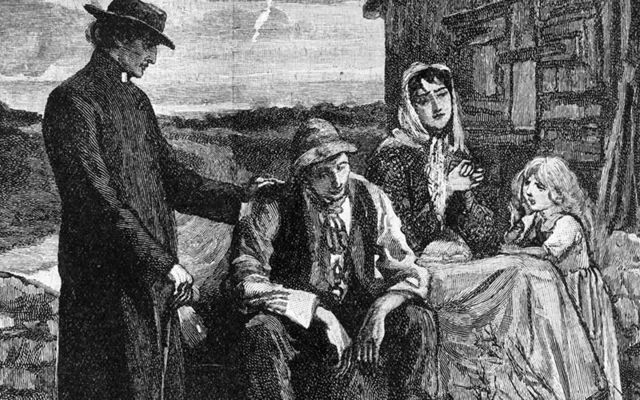A letter to the Cork Examiner published on this day in 1847 shines a light on the "nefarious" practice of "soul-jobbing" during the Irish Famine.
The irate letter attempted to "draw public attention to the disgraceful practice" of feeding starving Catholic children on the condition that they received Protestant religious instruction at the same time.
The practice of proselytizing starving Catholics (attempting to convert them to Protestantism) in return for food often meant that families had to choose between starvation and Protestantism.
Those who converted for food were often accused of "taking the soup" and became pariahs in their own communities. In her book "Black Potatoes: The Story of the Irish Famine", author Susan Campbell Bartoletti argues that rumors of proselytizing may have dissuaded starving Catholics from attending soup kitchens out of fear of betraying their Catholic faith.

Love Irish history? Share your favorite stories with other history buffs in the IrishCentral History Facebook group.
Published in 1847, the letter condemns the "disgraceful" practice, arguing that it had distracted people from "relieving the destitute".
"I just now want to draw public attention to a disgraceful practice that was carried on during the period of awful distress, when nothing should sway people from relieving the destitute, the practice of proselytizing, a new accompaniment of famine. The duties that devolved on the priest were indeed laborious, inasmuch as they had to combat against famine, disease, and death, on the one hand, and on the other, against those proselytizers, (justly termed soul-jobbers)," the letter stated.
Read more
"In every locality where this nefarious system worked, the proselytizing school consisted of about a dozen of the poorest children of the place, a Bible master or mistress was procured to diffuse knowledge to hungry stomachs. The pottage pot was superintended and conducted by the female proselytizer, and its salubrious contents distributed every day after five or six hours of lecturing, charitable donations were lavished in purchasing up bibles, paying the master or mistress so much per week, and as a matter of course, adding a little to their own private funds.
"Is it not melancholy to know that all this was in operation when famine and disease desolated the land? Now another year’s famine is impending; and I ask what will be done with those two traffickers, the proselytizer and the corn merchant? I can tell you they are ripe for another opportunity, and that will very shortly be at hand. In the meantime, public opinion ought to be brought to bear on them. Their very names should be set forth on the wings of the press as individuals base and degraded, to an extent, unmatched in any other country calling itself civilized."




Comments